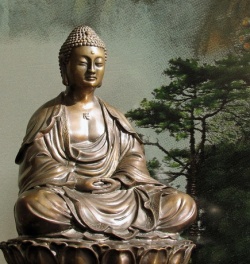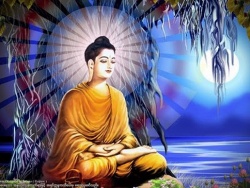Gautama, Siddhartha
Gautama, Siddhartha (Gotama, the Buddha) (c. 566—483 B. C. E)
Siddhartha was born in Lumbini in what is now the Kingdom of Nepal. The Buddha Dharma Education Association describes Siddhartha from their viewpoint:
His father, Suddhodana, was the ruler of the Sakya people and Siddhartha grew up living the extravagant life of a young prince. According to custom, he married at the young age of sixteen to a girl named Yasodhara. His father had ordered that he live a life of total seclusion, but one day Siddhartha ventured out into the world and was confronted with the reality of the inevitable suffering of life. The next day, at the age of twenty-nine, he left his kingdom and newborn son to lead an ascetic life and determine a way to relieve universal suffering.For six years, Siddhartha submitted himself to rigorous ascetic practices, studying and following different methods of meditation with various religious teachers. But he was never fully satisfied. One day, however, he was offered a bowl of rice from a young girl and he accepted it.
In that moment, he realised that physical austerities were not the means to achieve liberation. From then on, he encouraged people to follow a path of balance rather than extremism. He called this The Middle Way.That night Siddhartha sat under the Bodhi tree, and meditated until dawn. He purified his mind of all defilements and attained enlightenment at the age of thirty-five, thus earning the title Buddha, or "Enlightened One". For the remainder of his eighty years, the Buddha preached the Dharma in an effort to help other sentient beings reach enlightenment .
Siddhartha lacked belief in the Hindu scriptures (the Vedas), which he did not consider divine revelations. According to Karen Christina Lang, he rejected the authority of the priestly class (the Brahmans), the intermediaries between the Indian people and their gods. He believed in immediate experiences and reasoning powers, not revelation, in the search to understand the universe. He taught the middle path, how to avoid the extremes of severe asceticism and sensual indulgence. He believed that enlightenment (perfect enlightenment is the goal of Buddhism) is available to all, that meditation and education are the keys. He denounced the materialists for maintaining that events in the universe are chance occurrences, or determined by fate, independently of the karmic results of meritorious and demeritorious acts. He denied belief in a creator God and an external soul, so for all practical purposes he was an atheist.
Little wonder that Bertrand Russell, asked what religion he would choose if he were forced to choose, is said to have mentioned Buddhism.
Although there is a mystical element in the Buddha’s outlook, Lang concludes,
Consequently, given the usual definition of atheism as the rejection of belief in a personal creator God, Buddhism is atheistic.
Similarly, J. M. Robertson, quoting Max Muller’s Selected Essays, found, “It cannot be denied that if we call the old gods of the Veda - Indra and Agni and Yama - gods, Buddha was an atheist. He does not believe in the divinity of these deities. What is noteworthy is that he does not by any means deny their bare existence. . . . The founder of Buddhism treats the old Gods as superhuman beings.” Robertson adds, “Thus it is permissible to say both that Buddhism recognizes Gods and that it is practically atheistic.” For example, Gautama did write, “If God permits such misery to exist He cannot be good, and if He is powerless to prevent it, He cannot be God.”
“(Gautama) is chiefly interesting to us,” wrote Joseph McCabe, “from the fact that, though the religion which now goes by the name of Buddhism is a crass and to a great extent corrupt mass of superstitions, he was an atheist. It is admitted that he was educated in the Sankhya philosophy, which was atheistic. Brahmanism had become so abstract a religion, while the mass of the people clung to the grossest myths, that there was a wide spread of atheism at that time. Gautama decided to devote his life to a purely humanist and very simple preaching of ideals of conduct among the people.” McCabe cites Prof. T. Rhys Davids of Cornell as saying that Gautama “denied the existence of any soul” (cosmic or human).
The Encyclopaedia of Religion, however, entrusts its article on Buddha to one of the clerical writers who held that Buddha must have believed in God. “These sophists,” argues McCabe, “first argue that atheism is inconsistent with high ideals and then that any man whose ideals they cannot deny must have been a theist. The real authorities agree that Buddha was an atheist.”
When Siddhartha died in 483 B. C. E., it is said that four of his teeth and a burnt finger bone were plucked from the cremation pyre. One of the teeth and the finger bone are in China, two of the teeth are in Sri Lanka, and the fourth tooth disappeared in India. Myanmar’s largest and most revered religious shrine, the golden Shwedagon Pagoda in Yangon, is said to encase eight hairs of the Buddha.
The worship of relics has a long tradition in Buddhism, just as it does in other major religions. “Buddha” is a descriptive title, like President or Christ or Mahatma—if one can attain “perfect enlightenment,” that person becomes a Buddha. To the unenlightened of the Western world, however, the Buddha is simply an icon on an ash tray for hoi polloi, a topless fatty with a navel, one upon whom cigarettes and cigars are extinguished.
The following have gone on record as being Buddhists, although it is not clear whether they can be termed atheists or theists: Laurie Anderson, composer; Roberto Baggio, Italian soccer star; John Cage; Leonard Cohen, poet and musician; Peter Coyote, actor; Harrison Ford, actor; Richard Gere, actor; poet Allen Ginsberg; Oliver Stone, film director, producer; and Tina Turner, vocalist.

